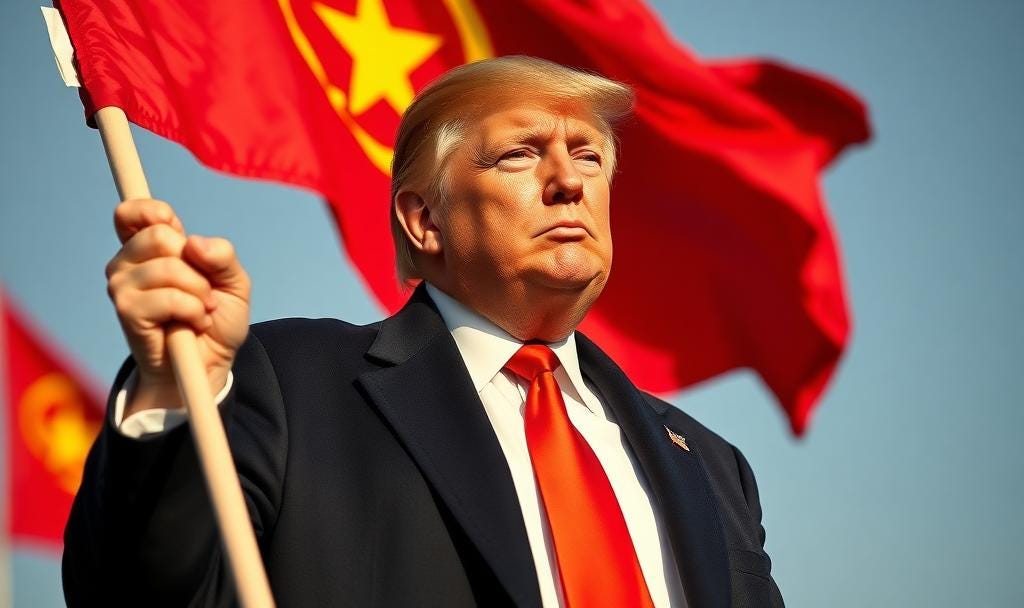Republicans, before the Donald Trump cult took hold, frequently railed (rightly so) against communist and fascist regimes that nationalized industry, indulged in crony capitalism, and substituted propaganda for the free flow of reliable information. (The five-year plan is working!) Well, well. How times have changed.
Sadly, but predictably, rather than reject these practices when they come from the Oval Office, corporate America, like Republicans more generally, has generally gone along with or whistled past the graveyard of capitalism, maintaining the pretense that all is well. Just as the First Amendment is too important to leave to the legacy media, a prosperous economy is too vital to leave to the Intel, Amazon, Space X, and other Wall Street spinners of conventional wisdom.
Former car czar Steven Rattner opined in The New York Times, “Mr. Trump is muscling his way into our economy in ways that are alien to traditional Republican principles, alien even to what more interventionist Democrats have argued for, and wildly at odds with any sensible notion of how the relationship between government and business should be managed.” Rattner noted that actions such as grabbing a 10% stake in Intel and trashing the independence of the Federal Reserve “bear resemblance to China’s state-directed capitalism.” Throw in a Rube Goldberg system of inflation-producing, growth-slowing tariffs, and you have the most anti-capitalist president in the modern era.
Consciously or not, Wall Street investors, pundits, and analysts keep alive the pretense of normalcy, as Nobel Prize-winning economist Paul Krugman explained:
[M]arkets will remain calm until the illusion of normality becomes unsustainable. At that point market prices may “change violently.” The current technical term for this phenomenon is a “Wile E. Coyote moment” — the moment when the cartoon character, having run several steps off the edge of a cliff, looks down and realizes that there’s nothing supporting him. Only then, according to the laws of cartoon physics, does he fall.
Though we can joke about refusing to anticipate entirely foreseeable events (including the Spanish Inquisition!), market cluelessness does not prevent an inevitable reckoning (e.g., the 2008 crash) when economic gravity sets in. Markets can reckon for only so long that someone or something (the Supreme Court? the Senate? the other Fed governors?) will intervene to halt the unwinding of an independent Fed, for example. Better to hang tough and hope for the best, says the crowd deathly afraid of starting an economic stampede to the bottom.
Even without a cataclysmic reaction in the markets, the attempt to fire Fed Governor Lisa Cook, on-again-off-again-on-again tariffs, huge deficits, and disinvestment in green energy are already taking their toll. Growth and hiring have slowed, and long-term interest rates have climbed as fear of protracted inflation ripples through the economy. (NBC News noted that “the yield, or return demanded by investors for lending to the government, on the 30-year Treasury note briefly climbed to August highs of about 4.9%, a sign investors are worried about longer-term inflation concerns.”)
All of this is compounded by Trump’s assault on data (i.e., facts) on which decision-makers must rely. In addition to Cook, he has fired the heads of the Bureau of Labor Statistics and the Centers for Disease Control and Prevention and experts across government responsible for collecting and promulgating critical information about the economy, weather, the environment, and health that informs decisions and acts as an early warning system. Trump thereby leaves Americans vulnerable to shocks that normal administrations would have spotted, responded to, and minimized before they could devastate people’s lives and wallets. (Don’t we all remember his downplaying covid?)
As Cook’s lawsuit against Trump and others for her illegal firing alleges:
The Federal Reserve’s effectiveness in managing inflation and economic stability depends on its credibility. If markets and the public believe that the central bank is making decisions based on political pressure rather than sound economic data, that confidence erodes. A lack of credibility can make a central bank’s job much harder; for example, if markets anticipate higher inflation in the long run due to a political decision to temporarily boost the economy, it can become a self-fulfilling prophecy. An independent central bank, by contrast, acts predictably and transparently, which stabilizes markets and the wider economy.
The same can be said of other government bodies that have reputations for credibility and competence. Once a corrupt, dictatorial regime mars their reputations, investors, consumers, employers, and lenders might simply hunker down, put off decisions, and hope the dust settles. That paralysis, which we have already glimpsed in the fallout from tariffs, leads to recession—or, with a Fed untethered to reality and principled economics, to stagflation.
We know that had a Democratic president run up the debt to $37 trillion, started a trade war, knocked job growth down from the 200,000s to the tens of thousands, tried to fire a fed governor to trigger a flood of easy money, fired experts who had the temerity to contradict him and his cultists withfacts, and prattled on endlessly with gobbledygook (birds and windmills!) and conspiracy theories, Democrats would have drawn up impeachment articles or demanded activation of the 25th Amendment. By now, however, we should not be surprised that spineless Republicans desperate to keep cushy jobs would rather see the economy self-destruct than speak up and risk MAGA wrath.
No one needs to wonder any longer how nations morph into police states under the thumb of dictators determined to wreak vengeance and destroy the lives and livelihoods of millions. It happens gradually and then suddenly.
The Contrarian is reader-supported. To receive new posts, enable our work, help with litigation efforts, and keep this opposition movement alive and engaged, please consider joining the fight by becoming a paid subscriber.

1 comment:
...he many things, but I don't think that he's a communist!
Post a Comment